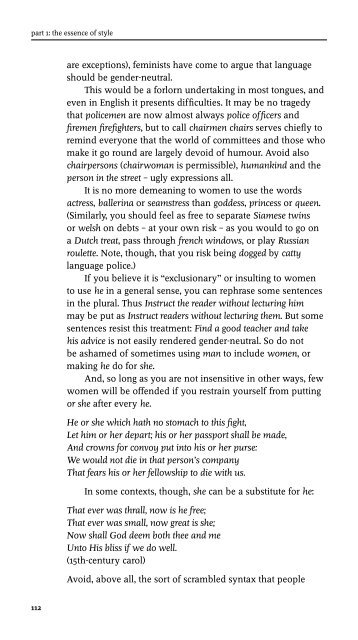Economist Style Guide - Redress Information & Analysis
Economist Style Guide - Redress Information & Analysis
Economist Style Guide - Redress Information & Analysis
Create successful ePaper yourself
Turn your PDF publications into a flip-book with our unique Google optimized e-Paper software.
part 1: the essence of style<br />
112<br />
are exceptions), feminists have come to argue that language<br />
should be gender-neutral.<br />
This would be a forlorn undertaking in most tongues, and<br />
even in English it presents diffi culties. It may be no tragedy<br />
that policemen are now almost always police offi cers and<br />
fi remen fi refi ghters, but to call chairmen chairs serves chiefl y to<br />
remind everyone that the world of committees and those who<br />
make it go round are largely devoid of humour. Avoid also<br />
chairpersons (chairwoman is permissible), humankind and the<br />
person in the street – ugly expressions all.<br />
It is no more demeaning to women to use the words<br />
actress, ballerina or seamstress than goddess, princess or queen.<br />
(Similarly, you should feel as free to separate Siamese twins<br />
or welsh on debts – at your own risk – as you would to go on<br />
a Dutch treat, pass through french windows, or play Russian<br />
roulette. Note, though, that you risk being dogged by catty<br />
language police.)<br />
If you believe it is “exclusionary” or insulting to women<br />
to use he in a general sense, you can rephrase some sentences<br />
in the plural. Thus Instruct the reader without lecturing him<br />
may be put as Instruct readers without lecturing them. But some<br />
sentences resist this treatment: Find a good teacher and take<br />
his advice is not easily rendered gender-neutral. So do not<br />
be ashamed of sometimes using man to include women, or<br />
making he do for she.<br />
And, so long as you are not insensitive in other ways, few<br />
women will be offended if you restrain yourself from putting<br />
or she after every he.<br />
He or she which hath no stomach to this fi ght,<br />
Let him or her depart; his or her passport shall be made,<br />
And crowns for convoy put into his or her purse:<br />
We would not die in that person’s company<br />
That fears his or her fellowship to die with us.<br />
In some contexts, though, she can be a substitute for he:<br />
That ever was thrall, now is he free;<br />
That ever was small, now great is she;<br />
Now shall God deem both thee and me<br />
Unto His bliss if we do well.<br />
(15th-century carol)<br />
Avoid, above all, the sort of scrambled syntax that people


